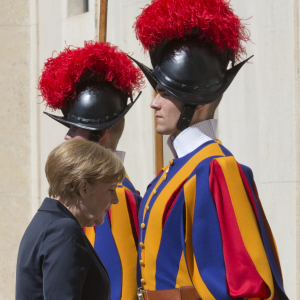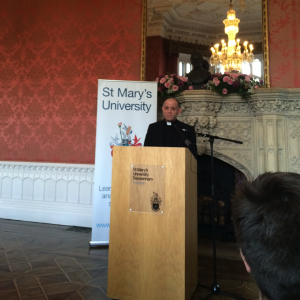Thursday saw the official opening of the Benedict XVI Centre for Religion and Society at St Mary’s University, Twickenham. Around 200 guests gathered in the Waldegrave Room to hear an introduction from Ruth Kelly, a Pro vice-chancellor of St Mary’s, and presentations by Dr Stephen Bullivant, the director of the new centre, and Fr Friedrich Bechina FSO (pictured), undersecretary at the Congregation for Catholic Education.
Dr Bullivant highlighted the main elements of the centre’s projected programme so far, inspired among other influences by the intellectual opus of Joseph Ratzinger, now Pope Emeritus Benedict XVI. The core of Benedict’s outlook was succinctly expressed when he elaborated on the necessary interconnectedness of faith and reason in his 17 September 2010 address in Westminster Hall. Of course Benedict XVI spoke on that same visit to Britain in the same Waldegrave Room where the Centre was launched.
Benedict’s dialogue with intellectuals like Jurgen Habermas are testimony also to his openness to debate with non-believers. The centre will be open to this spirit, and in partnership with University College London and Queens’ Belfast it has received a grant from the John Templeton foundation for a 15-month project on “The Scientific Study of Nonreligious belief”.
In partnership with Ave Maria University in the US, it is looking forward to the 50th anniversary of the 1968 encyclical Humanae Vitae with projects that begin with a “Re-engaging Humanae Vitae” conference at Ave Maria, where the centre will be represented by Catherine Pakaluk and Edmund Adamus.
It will host a seminar series on “Catholic Social Teaching, Politics and Society”, and later this month it will publish “Contemporary Catholicism in England and Wales”, a research project in which Dr Bullivant has drawn on the British Social Attitudes Survey to present a wide body of statistical research on church membership and Catholic practice. The volume aims to offer an invaluable resource for those in the Church involved in pastoral, evangelical and indeed administrative work.
Dr Bullivant also announced last night that, with the bishops of England and Wales, the Centre will be working on a “Courtyard of the Gentiles” initiative, of the sort pioneered in the papacy of Benedict XVI, to promote dialogue between believers and non-believers.
It will also take inspiration from the apostolic constitution promulgated by Pope John Paul II in 1990, Ex Corde Ecclesiae, in which St John Paul II set out a vision of what a Catholic university should be, “founded upon the conviction that interdisciplinary research, in which the sciences are brought into direct engagement with theology and ethics, is central to the life of a Catholic university (Ex Corde Ecclesiae, 46).”
Fr Bechina said that a Catholic university, today more than ever, was a place of relatively rare safety for the Church. Benedict XVI had always insisted that the Church should have no fear of the truth, as he was confident that the message of the Gospel would never be contradicted by anything that was true. But today one could not take the freedom to express church opinions for granted, as this freedom was less safeguarded than it was in the past. The academy, he said, may today be “the safest place for the Church to speak in the public sphere”.
KEEP UP TO DATE ON TWITTER AND FACEBOOK...
Follow all the latest news and events from the Catholic world via The Tablet's Twitter feed @the_tablet
Or you can join in the debate at our community page on Facebook




 Loading ...
Loading ...